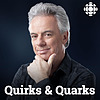
Quirks and Quarks
CBC
Categories: Science & Medicine
Add to My List
Listen to the last episode:
Previous episodes
-
622 - Quirks & Quarks is on hiatus for the summer. New podcasts will appear in SeptemberFri, 28 Jun 2024
-
621 - Listener Question showFri, 21 Jun 2024
-
620 - The age of monotremes, Third thumb, bird dream sounds, astronaut health database, aging and exercise, and sound perceptionFri, 14 Jun 2024
-
619 - The pursuit of gravity, and more…Fri, 07 Jun 2024
-
618 - Killer whales are ramming boats for fun, and more...Fri, 31 May 2024
-
617 - The risks and benefits of pandemic virus research and more…Fri, 24 May 2024
-
616 - Sounds and smells of nature, and more...Fri, 17 May 2024
-
615 - Why the famous Higgs particle plays the field and more…Fri, 10 May 2024
-
614 - Quirks & Quarks goes to the dogs -- a dog science specialSat, 04 May 2024
-
613 - Tiny black holes that could smash through our planet, and more…Fri, 26 Apr 2024
-
612 - Bonus: What On Earth's Earth Day specialMon, 22 Apr 2024
-
611 - Why this Indigenous researcher thinks we can do science differently, and more…Sat, 20 Apr 2024
-
610 - COVID-19’s “long tail” includes a range of impacts on the brain and more…Fri, 12 Apr 2024
-
609 - The dark side of LED lighting and more...Fri, 05 Apr 2024
-
608 - An Australian Atlantis and other lost landscapes, and more...Thu, 28 Mar 2024
-
607 - The future of freshwater — will we have a drop to drink, and more.Fri, 22 Mar 2024
-
606 - How animals eating, excreting and expiring is like the world's bloodstream, and moreFri, 15 Mar 2024
-
605 - How disabled primates thrive in the wild and more…Fri, 08 Mar 2024
-
604 - The boreal forest is on the move, and we need to understand how, and more...Fri, 01 Mar 2024
-
603 - Icelanders reap the costs and benefits of living on a volcanic island and more…Fri, 23 Feb 2024
-
602 - A post valentine’s look at humpback mating songs and a marsupial that’s sleepless for sexFri, 16 Feb 2024
-
601 - Scientists explore which came first, the chicken or the egg, and more…Fri, 09 Feb 2024
-
600 - An ancient tree’s crowning glory and more…Fri, 02 Feb 2024
Show more episodes
5























